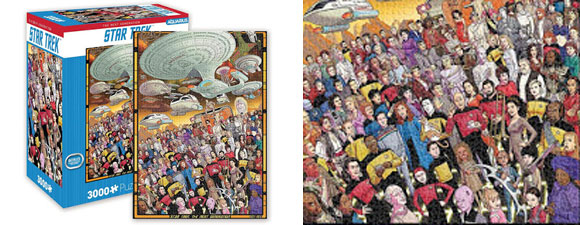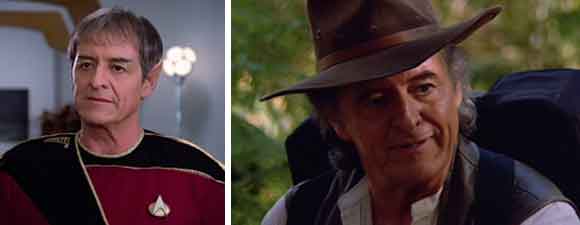Retro Review: Birthright, Part Two
6 min readWorf teaches Klingons being raised in a Romulan-run installation about their lost heritage as warriors.
Plot Summary: Held by Klingons in the onetime Romulan prison camp, Worf learns from L’Kor that after being captured, the Klingons asked the Romulans to allow them to remain following the Khitomer massacre to avoid dishonoring their families. The Romulan Tokath gave up a promising military career to take charge of the camp, and married a Klingon woman. Worf tries to escape, but Tokath puts a young Klingon named Toq in charge of his security. Worf tries to calm himself by performing Mok’bara, a Klingon form of martial arts, which interests the other young Klingons who allow him to teach them. Soon Ba’el – the young woman whom Worf first encountered – has joined Toq in trying to learn about her Klingon heritage. Worf tells them stories of Kahless and begins to fall in love with Ba’el, only to discover that she is half-Romulan, which disgusts him. Though angry at Worf’s prejudices, Ba’el asks Tokath, who is her father, whether she might leave the planet to visit either the Klingon or Romulan homeworlds. Tokath is dismissive, and when Toq arrives with an animal he killed on a ritual hunt, the Klingons begin to sing a warrior chant in defiance of the Romulans present. Tokath tells Worf that he must stop behaving as an agitator, to which Worf replies that he would rather die as a warrior than accept dishonor. Worf is scheduled to be executed, but first Toq, then his peers, and finally Ba’el stand in front of Worf to tell Tokath that he will have to kill all of them first. Finally Tokath agrees that Worf and any young Klingons who wish to leave the planet may do so. When the Enterprise encounters the warbird carrying them, Picard accepts Worf’s word that the rescued Klingons are crash survivors and that no one survived Khitomer.
Analysis: “Birthright, Part Two” features one of Michael Dorn’s best performances and really represents the rebirth of Klingon culture on Star Trek: The Next Generation, which will remain largely consistent throughout the run of Deep Space Nine and subsequent series and films. But there’s a price – our previous understanding of Klingon society, and of Worf’s background as a Klingon among humans. Gone is the character from the first season who wasn’t all that familiar with Klingon ritual and lore, and who shared with K’ehleyr disgust at some of the rationalizations for violence and cruelty that went on in the name of Klingon honor. Worf has gone from an outsider to a self-professed expert in Klingon behavior, and it’s not always easy to believe. Worf is horrified when he sees Toq using a Klingon weapon to till the soil and disgusted when he learns that Ba’el’s mother has allowed her weapons of war to rust. But while he may keep his bat’leth clean and practice with it on the holodeck, Worf doesn’t kill his own food or march around chanting hunting songs, either. Is his extreme reaction to the Klingons among Romulans an overreaction to his own position as a Klingon among humans? I wish there had been more introspection, more a sense of Worf working out why this means so much to him particularly once he realizes that his father was never among the survivors and his quest to reconnect with that aspect of his identity has been in vain.
Worf is largely sympathetic to the young Klingons, yet mostly expresses dismay that their elders did not commit suicide the moment they understood they could never escape the Romulans. He believes at first that he can make the young Klingons into warriors merely by teaching them of their heritage, and indeed, their transformation from peace-loving farmers to defiant rebels happens with almost absurd speed. Did he do them a favor, putting them in touch with instincts they all knew they had and couldn’t understand in this peaceful society, or did he introduce them to exactly the sorts of doubt and prejudice that Tokath said they’d done away with? Certainly the adults seem at peace with their own decision to go on living, if not delighted with the necessity of hiding among Romulans. They don’t blame the guards whom Tokath keeps around him for their plight – indeed, they invited them as the price for remaining alive and isolated in this camp. Yet we’re supposed to believe that their offspring have tapped into some primal Klingon warrior instinct that sparks anger at the Romulans yet not at the parents who made the choices that have shaped their lives. Sure, it’s an isolated, restrictive existence, but as Ba’el points out, they’ve been spared the horrors of war, they’ve never been hungry, they respect one another. It’s easy to see why the adults stopped raging against their fate.
In so many ways, Ba’el is caught in the middle. She is the daughter of the Romulan leader and also of the Klingon who seems the most angry and bitter at Worf’s reopening wounds from the past. We know that in the current reconception of the Klingons, women don’t have equal rights in the Council; was Gi’ral given an equal vote when the Klingons who survived Khitomer decided to stay in a Romulan camp? Did she love Tokath or merely accept that life with him would have certain advantages – even, perhaps, that as the wife of a Romulan, she might be treated as more of an equal than as the wife of a Klingon? And how did the other Klingons feel about her choice? We have no idea, though it appears that Ba’el is treated no differently than the other Klingon youths despite her Romulan blood by anyone but Worf. Though Ba’el is the first to ask whether she might have permission to leave, she is also the one youth who really has nowhere to go. Despite the identity of her father, the other Romulans treat her as a Klingon – she does not hang out with Tokath’s subordinates – and Worf makes it very clear that she will never be accepted by Klingons, since even he, who has feelings for her, cannot overcome his prejudices. The first time I saw this episode, I found Worf quite despicable in his scenes with her – he’s a bigot, despite the fact that his own son does not have pure Klingon blood and his mate was half-human. It’s easier to watch now, knowing that he will eventually date a Betazoid and marry a Trill, which suggests that his hatred is limited to the Romulans for their actions rather than a sense of Klingon superiority over all other races, but it’s still disturbing to see the depth of his intolerance.
For all the terrible things Worf says about the Romulans, most of which we have seen to be true – they are treacherous, deceitful, they don’t fight fair – they are also the culture that produced Toreth, Sela, the Romulan commander from whom Spock stole the cloaking device. The only really exciting Klingons produced this generation are the Duras sisters, and their good points are that they act like Romulans – self-serving, sneaky, etc. For all Worf’s praising of Klingon culture, I can’t help wanting Ba’el to choose to be more like her father – to put aside war in the service of community, to appreciate women who don’t always follow their husbands. Sure, Tokath has plenty of faults, his willingness to make a martyr of Worf being chief among them. But he doesn’t make the choice because he believes Klingons are inherently evil, which, sadly, makes him seem more enlightened than the Klingons. I wish Worf could have told Picard a bit more about his experiences, because I’d love for him to have heard Picard’s take on the situation and on letting go of the past.






